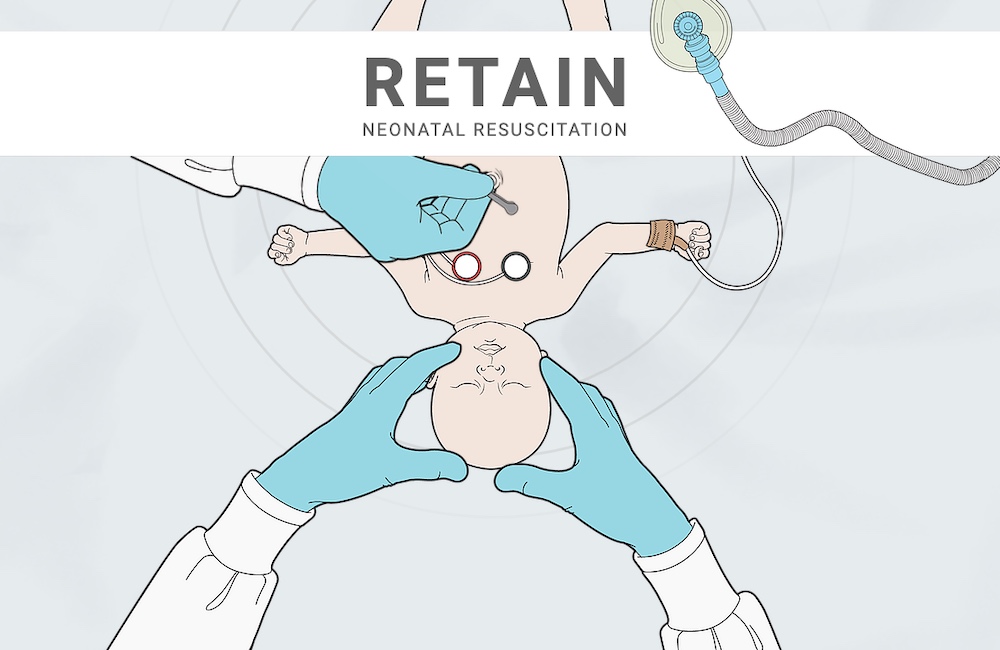Serious Games in Healthcare Education doesn’t just come in the video game format — but board games too! Today we take a look at the educational game platform “RETAIN” (Resuscitation TrAINing for Healthcare Professionals) provides a new approach to healthcare simulation based education which has both digital and board game components. The current resuscitation guidelines recommend frequent clinical simulation based education, however, the current approach is expensive, time-intensive, and requires a specialized sim lab and trained instructors. Hence, simulation in healthcare using manikins and a/v systems is not always available at all hospitals. The educational game platform “RETAIN” (Resuscitation TrAINing for Healthcare Professionals) combines board and computer games to train healthcare professionals in neonatal resuscitation in a cost-friendly and accessible way! The platform is available for pre-order now via the link at the bottom of this article!
Neonatal healthcare professionals require frequent simulation-based education to improve their cognitive, psychomotor, and communication skills during neonatal resuscitation. Simulation-based education activities can enhance knowledge retention and decrease human errors in real-life clinical situations. However, current simulation-based education approach is resource-intensive and not routinely offered in all healthcare facilities. There is a growing need for accessible training environments for everyone involved in healthcare.
The Retain Game originated from a vision to provide this training environment with a focus on neonatal resuscitation out of the University of Alberta Hospital & Royal Alexandra Hospital Edmonton. The RETAIN team designed the educational game platform “RETAIN” (Resuscitation TrAINing for Healthcare Professionals) to train healthcare professionals in neonatal resuscitation in a cost-friendly and accessible way. The RETAIN platform (RETAIN Labs Medical Inc., Edmonton, Canada) consists of a board game and a computer game, as tools that complement the physical simulation-based education to improve knowledge retention during neonatal resuscitation in the delivery room.
The RETAIN board game is a table-top serious board game simulator to train interdisciplinary healthcare professionals’ knowledge, communication, and team work skills during neonatal resuscitation. The game consists of 50 evidence-based scenarios, which were transcribed from real-life delivery room resuscitations at the Royal Alexandra Hospital, Edmonton, Canada.
During the game, healthcare professionals must prepare and perform resuscitations using equipment, supplies, action and debrief cards; along with adjustable monitors. The game can be played individually or with up to 4 players as an interdisciplinary team (e.g., doctors, trainees, nurse practitioner, nurse, or respiratory therapist). The game also includes action and debriefing cards, and visual objects representing tools, equipment and medication, which are placed on the board. Each action card has an image representing an action (e.g., prepare medication, give chest compressions etc.) along with text representing each action on the front side. Furthermore, each action card has a QR code, which will be linked to the RETAIN platform and will provide additional educational resources.
The action cards include:
- Set-up cards, which function as checklists prior to delivery
- Assign Roles cards to assign each player’s role
- Basic cards (e.g., dry, stimulate, assess breathing); iv) Ventilation cards (e.g., Provide Continuous Positive Airway Pressure); v) Cardiovascular cards (e.g., Give Chest Compressions); vi) Venous Access cards (e.g., Establish Vascular Access)
- Medication cards (e.g., Administer Medication); viii) Post Resuscitation cards (e.g., Admit to NICU, Transfer to Mother, update Parents)
- Debrief-cards (e.g., what was good about the resuscitation, or what could you do better next time?).
Helpful information about the action (e.g., how to perform the action or helpful visual cues) is presented on the reverse side. Furthermore, action cards are associated with one or more visual objects.
At the start of the game, players receive a personal board with their role indicated on the corner, and space to keep the visual objects and action cards assigned to their role. The board game also has reference tables (e.g., oxygen saturation targets) and mnemonics (e.g., MR. SOPA [M(mask adjustment), R(reposition airway), S(suction mouth and nose), O(open mouth), P(pressure increase), A(alternate airway] and DOPES [Displacement of the endotracheal tube, Obstruction of the endotracheal tube, Pneumothorax, Equipment failure, Stomach distension]) at the top of the game board. There are adjustable timers and monitors (e.g., Apgar clock, Heart rate), which are adjusted as each scenario proceeds.
Researched for Improved Outcomes
In a recent study the RETAIN board game improved knowledge retention between a written pre- and post by 12% (49% to 61%, respectively). A second study demonstrates that the RETAIN Board game is a more effective summative assessment tool compared to a written test. The RETAIN Board game allowed for a more in depth observation of the participant during the test (e.g., in the written assessment someone might write MR. SOPA as the correct answer but does not necessarily know all the steps; however, during an assessment with RETAIN each MR. SOPA step must be performed to be scored correctly).
Overall, there was a 30% more accurate scoring using the RETAIN board game compared to a written test. The improvement in performance and knowledge along with a more objective assessment tool supports the use of the RETAIN board game for training of healthcare professionals.
Learn More About the Neonatal Resuscitation Board Game RETAIN!
Today’s article was guest authored by Georg Schmölzer, MD, PhD, Clinician Scientist at RETAIN Labs Medical Inc.
Have a story to share with the global healthcare simulation community? Submit your simulation news and resources here!








